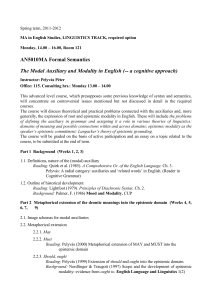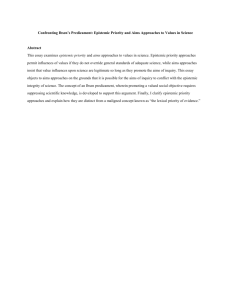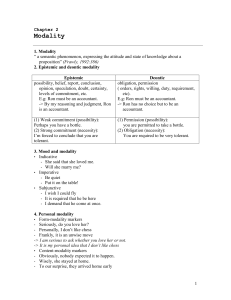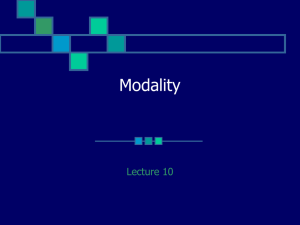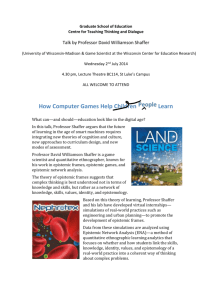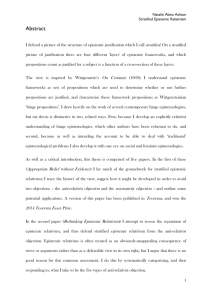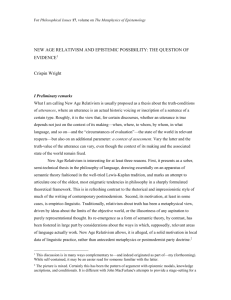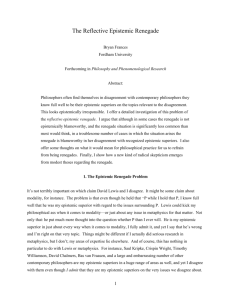Synopsis - Wylie Breckenridge
advertisement
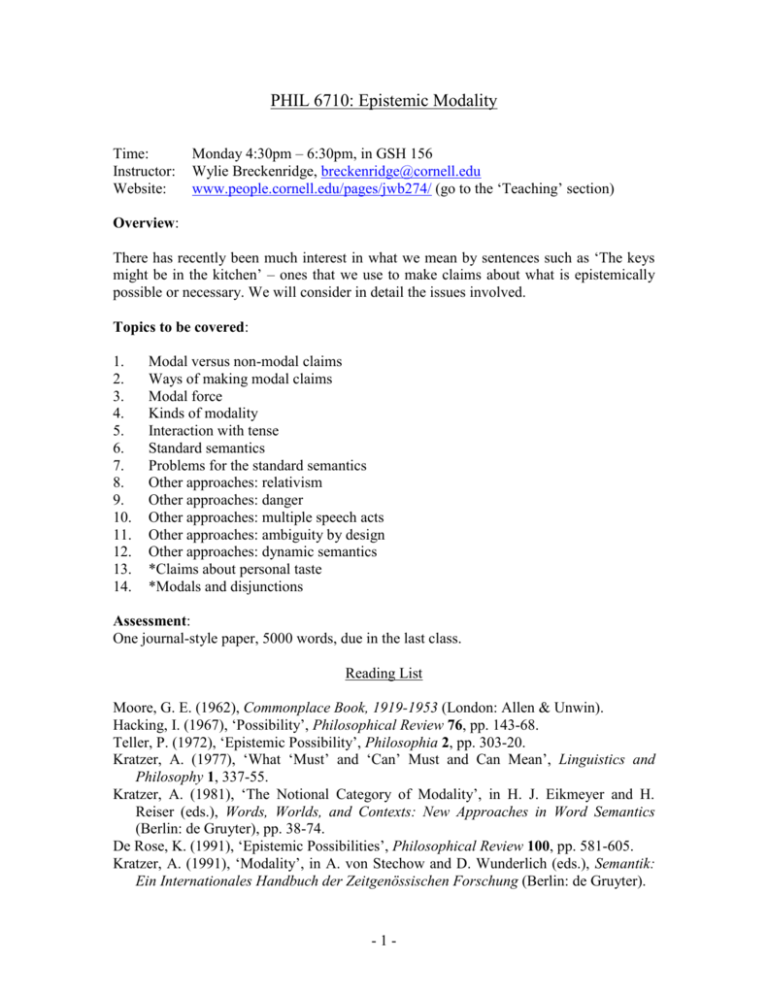
PHIL 6710: Epistemic Modality Time: Instructor: Website: Monday 4:30pm – 6:30pm, in GSH 156 Wylie Breckenridge, breckenridge@cornell.edu www.people.cornell.edu/pages/jwb274/ (go to the ‘Teaching’ section) Overview: There has recently been much interest in what we mean by sentences such as ‘The keys might be in the kitchen’ – ones that we use to make claims about what is epistemically possible or necessary. We will consider in detail the issues involved. Topics to be covered: 1. 2. 3. 4. 5. 6. 7. 8. 9. 10. 11. 12. 13. 14. Modal versus non-modal claims Ways of making modal claims Modal force Kinds of modality Interaction with tense Standard semantics Problems for the standard semantics Other approaches: relativism Other approaches: danger Other approaches: multiple speech acts Other approaches: ambiguity by design Other approaches: dynamic semantics *Claims about personal taste *Modals and disjunctions Assessment: One journal-style paper, 5000 words, due in the last class. Reading List Moore, G. E. (1962), Commonplace Book, 1919-1953 (London: Allen & Unwin). Hacking, I. (1967), ‘Possibility’, Philosophical Review 76, pp. 143-68. Teller, P. (1972), ‘Epistemic Possibility’, Philosophia 2, pp. 303-20. Kratzer, A. (1977), ‘What ‘Must’ and ‘Can’ Must and Can Mean’, Linguistics and Philosophy 1, 337-55. Kratzer, A. (1981), ‘The Notional Category of Modality’, in H. J. Eikmeyer and H. Reiser (eds.), Words, Worlds, and Contexts: New Approaches in Word Semantics (Berlin: de Gruyter), pp. 38-74. De Rose, K. (1991), ‘Epistemic Possibilities’, Philosophical Review 100, pp. 581-605. Kratzer, A. (1991), ‘Modality’, in A. von Stechow and D. Wunderlich (eds.), Semantik: Ein Internationales Handbuch der Zeitgenössischen Forschung (Berlin: de Gruyter). -1- MacFarlane, J. (2003), ‘Future contingents and relative truth’, Philosophical Quarterly 53, pp. 321–336. Egan, A., J. Hawthorne, and B. Weatherson (2005), ‘Epistemic Modals in Context’, in G. Preyer and G. Peter (eds.), Contextualism in Philosophy (Oxford: Oxford University Press), pp. 131-68. MacFarlane, J. (2005), ‘Making Sense of Relative Truth’, Proceedings of the Aristotelian Society 105, pp. 321-39. Lasersohn, P. (2005), ‘Context Dependence, Disagreement and Predicates of Personal Taste’, Linguistics and Philosophy 28, pp. 643-86. von Fintel, K. (2006), ‘Modality and Language’, in Donald M. Borchert (ed.), Encyclopedia of Philosophy, Second Edition (Detroit: MacMillan Reference USA). Heck, R. (2006), ‘MacFarlane on Relative Truth’, Philosophical Issues 16, pp. 88-100. Papafragou, A. (2006), ‘Epistemic modality and truth conditions’, Lingua 116, pp. 16881702. Egan, A. (2007), ‘Epistemic Modals, Relativism, and Assertion’, Philosophical Studies 133, pp. 1-22. Von Fintel, K., and Gillies, A. (2007), ‘An Opinionated Guide to Epistemic Modality’, in Gendler & Hawthorne (eds.), Oxford Studies in Epistemology 2. Glanzberg, M. (2007), ‘Context, Content, and Relativism’, Philosophical Studies 136, pp. 1-29. Hawthorne, J. (2007), ‘Eavesdroppers and Epistemic Modals’, Philosophical Issues 17, pp. 92-101. Huemer, M. (2007), ‘Epistemic Possibility’, Synthese 156, pp. 119-42. Stephenson, T. (2007), ‘Judge Dependence, Epistemic Modals, and Predicates of Personal Taste’, Linguistics and Philosophy 30, pp. 487-525. Von Fintel, K., and Gillies, A. (2007b), ‘Might Made Right’. Wright, C. (2007), ‘New Age Relativism and Epistemic Possibility: The Question of Evidence’, Philosophical Issues 17. Yalcin, S. (2007), ‘Epistemic Modals’, Mind 116, pp. 983-1026. Zimmerman, A. (2007), ‘Against Relativism’, Philosophical Studies 133, pp. 313-48. Von Fintel, K., and Gillies, A. (2008), ‘CIA Leaks’, Philosophical Review 117, pp. 7798. MacFarlane, J. (2008), ‘Epistemic Modals are Assessment-Sensitive’, forthcoming in B. Weatherson and A. Egan (eds.), Epistemic Modality (OUP). Swanson, E. (2008), ‘Modality in Language’, Philosophy Compass 3, pp. 1193-1207. -2-

